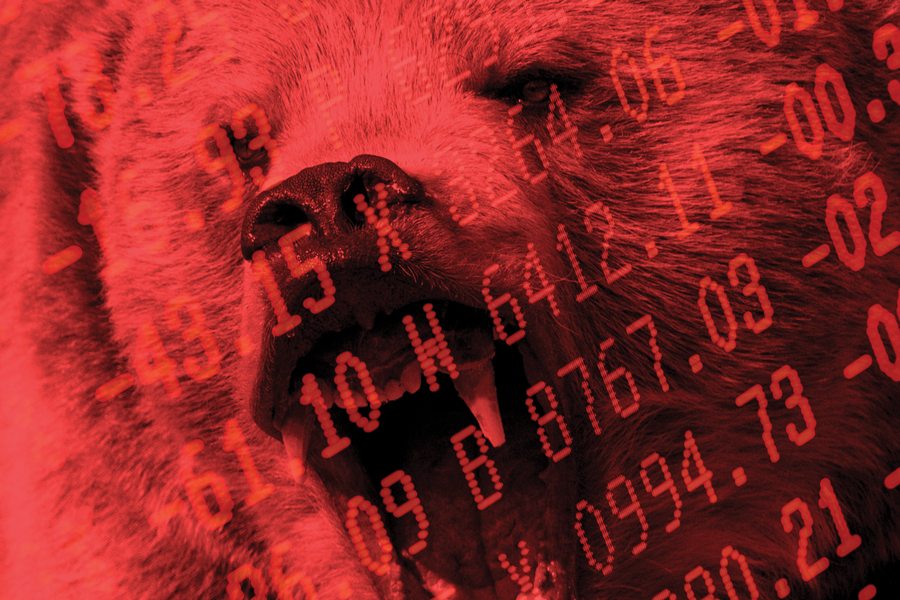

Stock market sentiment is extremely bearish right now, with the S&P 500 Index down about 15% year-to-date, and that situation creates opportunities for investors, two top investment managers said Monday in a panel discussion at the Morningstar Investment Conference in Chicago.
Worries that the Federal Reserve’s moves to cool inflation will lead to a recession is the primary weight on the stock market, but neither T. Rowe Price’s David Giroux nor BlackRock’s Kate Moore is forecasting a recession.
“BlackRock is squarely in the ‘no recession’ at this moment camp,” said Moore, managing director and head of thematic strategy at BlackRock Inc., the $9.6 trillion asset manager.
She said none of the macro and microeconomic data BlackRock reviews suggests the likelihood of a recession over the next four quarters, in spite of the pressures the U.S. economy faces, including inflation, rising interest rates and geopolitical worries over Russia’s invasion of Ukraine and the slowing in China’s economy caused by Covid lockdowns.
“We feel really encouraged, frankly, by the health of the consumer balance sheet and the health of the corporate balance sheet," Moore said. "I think we're going to be able to weather the storm.”
Giroux, portfolio manager for the $28.7 billion T. Rowe Price Capital Appreciation Fund (PRWCX) and chief investment officer for T. Rowe Price Investment Management, said the valuation of some stocks, such as industrial conglomerates, have fallen so far that they're pricing in a recession that may not happen. That’s one sector where the fund has added to its portfolio in light of the sell-off, he said.
How they’re positioning their portfolios now differs, though.
Giroux entered 2022 with a 12% cash position and underweight equities by 200 basis points, but now has a 3% cash position and is overweight equities by 400 basis points. He said historically during market corrections, T. Rowe Price is an opportunistic buyer with a long-term focus.
Giroux’s fund is now overweight information technology for the first time in about 15 years and also bought semiconductors. He said the big tech names such as Apple (AAPL), Microsoft (MSFT), Google (GOOGL) and Amazon (AMZN) have all seen their valuations fall. In particular, he sees value in Amazon for its Amazon Web Services business.
The fund also sold some profitable stocks in consumer staples and health care, and moved to an underweight in utilities after being overweight for several years, he said.
While Giroux is buying, Moore remains cautious. She said BlackRock is sitting on a 30% cash position, having raised cash early this year ahead of Russia's invasion of Ukraine. The asset manager reduced duration and moved into short-term securities and cash equivalents on the expectation of Fed rate hikes.
“We're taking a more cautious approach over the next couple months, and frankly, [we are] heavily using options strategies to express our risk-on views,” she said.
There are a few sectors Moore likes and sees providing opportunities when she’s ready to buy, such as the cloud ecosystem and cybersecurity. She also likes the agricultural complex, specifically mentioning seeds, fertilizer, crop protection and agriculture technology.
“We’re going to see elevated food prices because of Ukraine,” she said, as the Russian invasion halts crop production in the country, which is normally a big grain exporter.
Moore said while BlackRock doesn’t expect a recession soon, she is concerned that all the talk about a recession could cause companies to delay projects and other capital expenditures.
“We’re not seeing canceling of projects, but I do expect that you will see a slight pause in planning, if not indefinite delays. And that won't be great for the [economic] cycle,” she said.
Debbie Carlson writes about investing, personal finance and retirement.

Relationships are key to our business but advisors are often slow to engage in specific activities designed to foster them.

Whichever path you go down, act now while you're still in control.

Pro-bitcoin professionals, however, say the cryptocurrency has ushered in change.

“LPL has evolved significantly over the last decade and still wants to scale up,” says one industry executive.

Survey findings from the Nationwide Retirement Institute offers pearls of planning wisdom from 60- to 65-year-olds, as well as insights into concerns.
Streamline your outreach with Aidentified's AI-driven solutions
This season’s market volatility: Positioning for rate relief, income growth and the AI rebound
